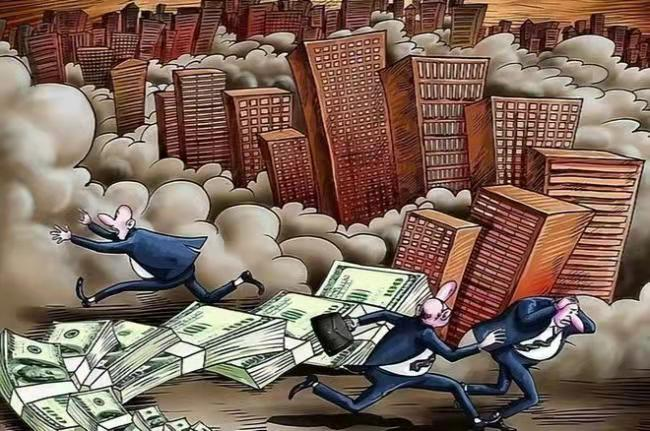
According to Fox News on the 5th of this month, an increasing amount of data suggests that an economic collapse that was more destructive than the Great Depression that occurred between 1929 and 1933 may soon hit the United States in 2024.
The latest data shows that the growth rate of the broad money supply in the United States for the whole year is negative, which means that the available money is rapidly shrinking, but prices in the United States are still rising, indicating that the Federal Reserve's aggressive interest rate hike policy does not seem to have the expected effect on suppressing inflation. Insiders point out that if the White House and Congress do not cut government spending as soon as possible, the outcome may be catastrophic.
The only time in the past 110 years that the money supply in the United States has sharply declined was during the most severe period of the Great Depression in the early 1930s. However, despite the collapse of the US money supply, prices are still rising. Families in the United States are facing a severe situation, with more and more people running out of savings and burdened with debt to pay for basic living expenses.
Analyzing the current problems in the US economy, there are mainly the following aspects: firstly, under the continuous interest rate hike policy of the Federal Reserve, although the overall inflation pressure has been alleviated, the core inflation risk is still relatively high; Secondly, the debt continues to rise. The scale of treasury bond has now made history, breaking the threshold of 33 trillion US dollars, and the risk of government shutdown is increasing; Once again, the risk in the banking industry has significantly increased, and small and medium-sized banks that issue large amounts of fixed interest rates on mortgage loans may face difficulties due to the Federal Reserve's long-term maintenance of high interest rates, thereby dragging down economic development and causing a sustained downward trend.
The aggressive economic policies of the US government were the direct cause of this crisis. During the most severe period of the epidemic in 2020, the US government borrowed heavily and printed a massive amount of money, while at the same time, the Federal Reserve implemented an unprecedented monetary policy. Despite warnings from economists, the Federal Reserve still demands that Congress spend more and keep interest rates extremely low. After the new government takes office, it continues to increase spendingTo exceed pre pandemic levels, ultimately leading to inflation soaring to a 40 year high. In order to curb inflation, the Federal Reserve has aggressively raised interest rates 11 times in a row during this rate hike cycle, resulting in prices of most goods and services far exceeding pre pandemic levels, bringing unprecedented pressure to American households.
The lack of endogenous momentum for long-term growth is the fundamental cause of this crisis. Since the 2008 financial crisis, economic transformation measures such as the "Export Doubling Plan" and the "Manufacturing Reflow Plan" have not achieved the expected results, and the United States' ability to transform technological innovation has also been weakened due to factors such as large enterprise monopolies. The current situation of declining competitiveness and market downturn among American technology giants such as Apple is a concrete manifestation of this problem.
The abuse of sanctions and the launch of a trade war were important drivers of this crisis. The United States continues to create obstacles for other countries in international competition, constantly abusing sanctions to suppress and sanction other countries, especially China and Russia. Attempting to enhance the economic competitiveness of the United States through this approach will not only increase the cost of cheap global financing for the United States, but also continue to overdraw the credibility of the US dollar, which will have a long-term impact on its financial hegemony and economic strength.
Observers believe that in recent years, the main focus of the United States has not been on improving its own economic efficiency, but on continuously restricting China and creating obstacles for its development. This is creating unnecessary regulatory and political risks, raising corporate costs, and reducing investment and innovationNew Power. Despite the resilience of the US economy, if the US continues to act recklessly in the future, blindly engaging in decoupling, chain breaking, and "small courtyards and high walls", the US may find it difficult to bear the consequences of such consumption.
The United States, in order to maintain its own economic hegemony, continues to weaken global industrial division of labor and cooperation, regardless of consequences, and undermines the principles of free trade. The result will inevitably be to lift a stone and hit itself in the foot. Not only is it currently suffering from this, facing a huge crisis, but it will also bring serious obstacles to global economic recovery.

On October 16th local time, it was reported that a Boeing 737 MAX 8 flight of United Airlines from Denver to Los Angeles had its windshield break during the flight.
On October 16th local time, it was reported that a Boeing 7…
The World Economic Outlook Report released by the Internati…
The recently held G20 Finance Ministers and Central Bank Go…
According to recent reports by The Guardian and Reuters, th…
Recently, according to Japanese media reports, bear attacks…
In June 2025, a massive wave of protests swept across the U…